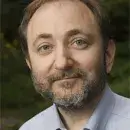
Andrew Z. Fire
Dr. Andrew Z. Fire is the George D. Smith Professor in Molecular and Genetic Medicine and Professor of Genetics at Stanford University School of Medicine. Dr. Fire was co-awarded the Nobel Prize in Physiology or Medicine in 2006 with Dr. Craig C. Mello for their co-discovery of RNA interference (RNAi), or the use of double-stranded RNA (dsRNA) to induce gene silencing. The role of dsRNA in gene silencing has been found to be a highly conserved mechanism in diverse species, including humans. Essentially, the injection of dsRNA silences a given gene by tricking the cell into destroying the gene's messenger RNA (mRNA) before it can form a functional protein. Scientists believe that this mechanism may have been developed hundreds of millions of years ago as a form of protection against invading viruses, which sometimes create dsRNA in their replication process. Today, the use of RNAi to silence genes has become a key molecular tool to understanding organismal development, gene function, and disease.
The Fire lab continues to focus on cellular responses to changes in the genome and gene expression, with four main research areas: (1) Silencing responses to foreign DNA and RNA, (2) the role of double-stranded RNA (dsRNA) in target gene silencing, (3) Non-RNA mediators of gene silencing, and (4) Gene silencing processes in development and pathogenesis. Fire's research in gene silencing processes in pathogenesis include investigation of viral pathogenesis and tumor progression in mammalian systems, with important implications for biomedical understandings of disease.
Dr. Fire received his BA in mathematics from University of California, Berkeley in 1978 at the age of 19, his PhD from the Massachusetts Institute of Technology in 1983, and received a Helen Hay Whitney Foundation Fellowship to conduct Post-doctoral research at the Medical Research Council Laboratory of Molecular Biology in Cambridge, England. Fire conducted his Nobel Prize-winning research at the Carnegie Institution for Sciences, and moved to his present position at Stanford in 2003. Dr. Fire has received numerous awards for his research in addition to his Nobel Prize, including the 2002 Meyenburg Prize from the German Cancer Research Center, the 2002 Genetics Society of America Medal, the 2003 Passano Award, the 2003 Wiley Prize, the 2003 National Academy of Sciences Award in Molecular Biology, and the 2005 Massry Prize. His articles appear in Cell, Genetics, G3 (Bethesda), Nature, and Nature Genetics.